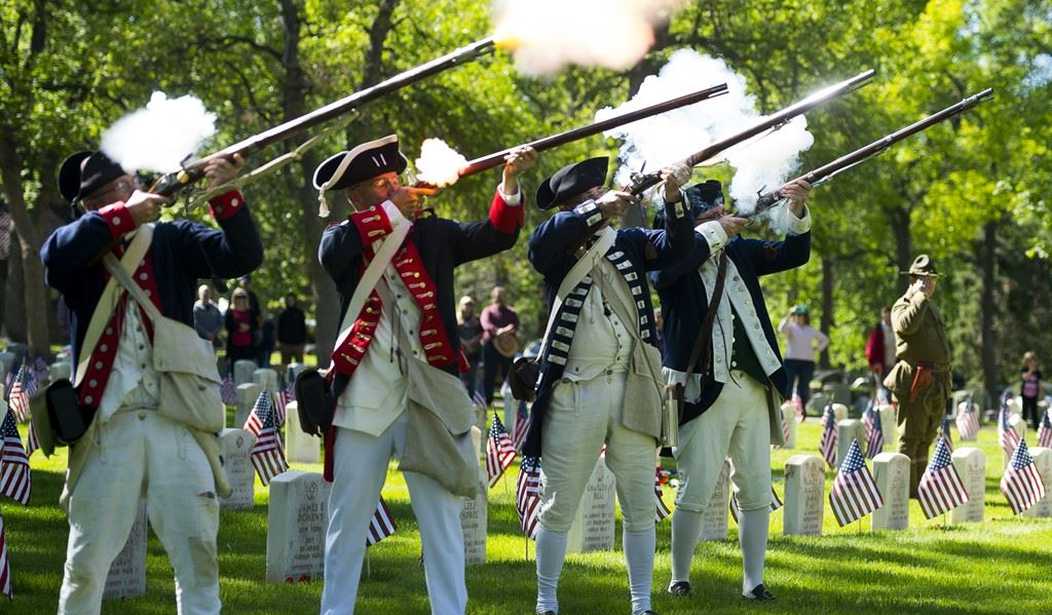Today, April 19, is the anniversary of two different rebellions against tyranny and for freedom: the start of the American Revolution and the Warsaw Ghetto Uprising. From the heroes of these two movements, we can learn valuable lessons about the vital necessity of liberty and the refusal to give up, no matter the odds.
In 1775, the “shot heard round the world” was fired on Lexington Green. Patriot minutemen faced down British troops, and in Concord and all the way back to Boston, the militia pursued the harassed British troops. The colonists would no longer submit to imperial tyranny; they would not surrender their guns or their liberties. Less than 200 years later (1943), on another continent but on the same day, the Jews imprisoned by Nazis in the Warsaw Ghetto marked the eve of Passover by armed resistance. The American Revolution was ultimately successful; the Warsaw Uprising was not. But the brave men who fought in both conflicts understood that it is better to die fighting for freedom than to live enslaved to murderous tyrants.
A part of G.K. Chesterton’s “Battle of the White Horse” examines this very reality. All the great chiefs of the English forces except King Alfred have been killed fighting the pagan Danes, and the ordinary soldiers are fleeing the field in panic. Alfred checks their retreat and gives an eloquent speech. He asks the men if it is better “To sweat a slave to a race of slaves, / To drink up infamy? / No, brothers, by your leave, I think / Death is a better ale to drink, / And by all the stars of Christ that sink, / The Danes shall drink with me.” And so the ordinary peasants turn and rush upon the Danes. A vision of Jesus’s Mother Mary appears above the battlefield, and the English Christians miraculously win a victory.
We might not have to take up physical arms in defense of liberty unless we are in the military (though it seems increasingly necessary to be prepared always to defend oneself against crooks and criminals), but we will have our struggles nonetheless. The great Ronald Reagan said, “Freedom is a fragile thing, and it's never more than one generation away from extinction.” For some generations, the fight has been overseas using physical weapons. For other generations, the fight is political and social.
We are certainly in the middle of a great culture war right now, a battle for the very survival of our Republic. The Biden administration is blatantly violating constitutional rights, and unvetted foreigners continue to inundate our border. Do we recognize the gravity of this struggle? Are we prepared to risk our jobs, our friendships, our bank accounts, and even our lives for the cause? Is it better to risk danger for liberty or to submit tamely to political slavery?
Thomas Paine, whose writings were so crucial to inspiring the American Revolutionaries, recalled in his “American Crisis” hearing a man with his little child standing beside him repeat the Loyalist or Tory mantra, “Well! Give me peace in my day.” Paine angrily called the sentiment “unfatherly,” suggesting the man should have said, “If there must be trouble, let it be in my day, that my child may have peace.” Paine referred to the Revolutionary conflict then unfolding as inevitable. Matters had to come to a head sometime, he argued, and it was better to take on the fight now. He might well have noted that one who keeps refusing opportunities to stand up for liberty often finds that, eventually, it is too late.
Related: Lincoln’s Assassination and the Battle for America
The Americans rose up to fight for liberty and won, though they suffered deaths and defeats along the way. The Warsaw Ghetto Uprising failed in one sense but not in another. The Jews there were being deported from the appallingly inhumane ghetto to the death camps. They had the choice of a courageous death after fighting the Nazis or death after quietly climbing into the deportation vehicles. No brave death is ever wasted, and no act of heroism is ever in vain. One thing is certain: he who doesn’t fight may fail or die, but he certainly won’t win. He who fights may fail or die, but he can also win. Washington, Hamilton, Jefferson, Hugh Mercer, and the other Revolutionaries risked everything because they believed life without liberty was not worth living.
The echoes of Founder Patrick Henry’s challenge still ring true from Lexington to Concord to Warsaw to here. Will you stand up in schools, businesses, rallies, polling places, and school boards? Will you take on the new tyranny and fight the culture war? As Henry said, “Is life so dear, or peace so sweet, as to be purchased at the price of chains and slavery? Forbid it, Almighty God! I know not what course others may take; but as for me, give me liberty or give me death!”








